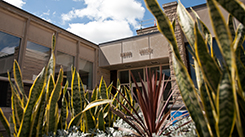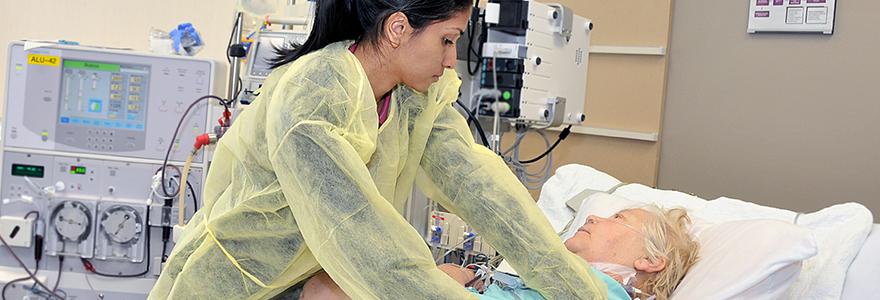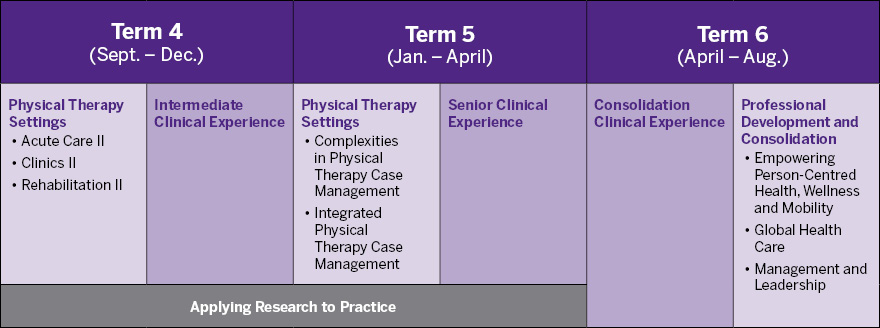Programs

MPT Admissions Information
ptadmit@uwo.ca
519-661-3360
Apply Now
Applications to the Master of Physical Therapy (MPT) program are now open.
Program Model and Courses

The Master of Physical Therapy (MPT) degree is awarded upon successful completion of a two-year curriculum which includes 60 weeks of academic learning and 30 weeks of clinical experiential learning. The program prepares students to seek licensure to practice physiotherapy in Canada in a wide range of practice settings, and across the broad and diverse roles of the profession.
Collaborative, Experiential Case-Based Learning
This signature pedagogy of the MPT program is a student-centred model of inquiry-based learning. It supports learners to acquire knowledge both independently and collaboratively through engaging with a learning team. Application of knowledge and advanced analysis of authentic clinical cases fosters the development of essential professional competencies. Cases are carried into practical laboratory sessions, facilitating case inquiry and an experiential learning environment.
Settings-Based Model
Courses in the MPT program align with the traditional settings of practice – Acute Care, Rehabilitation, Clinics and Community. Each settings-based course has curriculum content and cases tailored to a specific setting of practice. To prepare for the settings-based courses, students acquire foundational knowledge and skills of Physical Therapy practice in the first term of the program. Courses at the end of the program allow students to integrate their settings-based knowledge and apply it to complex clinical cases.
Blended Learning
Student learning is supported through a combination of in-person and virtual activities. In-person learning sessions include activities such as clinical skills practice, group discussions and lectures. Virtual learning activities use a multi-media approach, including synchronous and asynchronous activities.
Program Curriculum
All students are enrolled in a predetermined MPT program curriculum and schedule.
First-Year Courses
The first year of the MPT curriculum introduces students to the field of physical therapy and provides an opportunity for students to participate in their first clinical placement.

Term 1: September - December
ACB9501 - Functional Human Anatomy
The overall course objectives are to:
- Identify the major structures of each of the body regions
- Correlate structure and function as it applies to the gross anatomical features and overallfunction of the body systems
- Integrate basic physiological and biomechanical concepts, to better understand the grossanatomical structure and function
- Provide practical examples of how the anatomical knowledge may be applied to the students’ varied disciplines (kinesiology, physical therapy (PT) and occupational therapy (OT))
- Develop an appreciation for mechanisms of injury and congenital anomalies
PT9111 - Foundations of Physical Therapy: Science and Theory of Practice
This course is designed to introduce students to the fundamental scientific and theoretical elements which support the development of practitioners of Physical Therapy across common practice settings in Canada.
PT9112 - Foundations of Physical Therapy: Clinical Skills of Practice
This course is designed to introduce students to the fundamental clinical skills of physiotherapy practice which supports the development of practitioners of Physical Therapy across all common practice settings in Canada.
IPE9801 - Interprofessional Education: Professional Practice
This course will prepare students for professional practice as an autonomous regulated healthcare practitioner in ever-changing and complex practice environments. Through interprofessional education (IPE), students from the Schools of Communication Sciences & Disorders, Occupational Therapy and Physical Therapy will be introduced to the concepts of professionalism and to the attitudes, values, competencies and accountabilities associated with being a regulated healthcare professional.
IPE9802 - Interprofessional Education: Critical Appraisal
This course is designed to provide health disciplines professional students with the knowledge base and opportunities to develop the skills required to critically appraise a diverse range of research methodologies and clinical literature.
Term 2: January - April
January - February (Physical Therapy Settings Module 1)
PT9121 - Physical Therapy in Acute Care Settings I
This course is designed to introduce students to the assessment, critical evaluation and physiotherapy management of individuals with cardiac, vascular, respiratory, neurological, and/or musculoskeletal dysfunction commonly treated in the acute care (hospital) setting. Students are expected to integrate foundational knowledge of respiratory and cardiovascular anatomy and physiology into physiotherapy clinical decision making.
PT9123 - Physical Therapy in Clinic Settings I: Lower Quadrant
This course is designed to introduce students to the underlying fundamentals of Physical Therapy assessment and treatment of acute and persistent/recurrent conditions affecting the neuromusculoskeletal system of the lower quadrant typically managed in the clinics setting of practice.
IPE9802 - Interprofessional Education: Critical Appraisal
This course is a continuation of Term 1 IPE9802y - Interprofessional Education: Critical Appraisal.
February - April (Physical Therapy Settings Module 2)
PT9121 - Physical Therapy in Acute Care Settings I
This course is a continuation of Term 2, Module 1 PT9121x – Physical Therapy in Acute Care Settings I.
PT9122 - Physical Therapy in Rehabilitation Settings I
This course is designed to expose students to patient populations commonly seen in a rehabilitation setting. Through the use of community patient volunteers, simulated patients, and case studies the students will learn the assessment, treatment planning and treatment intervention for a wide variety of impairments arising from stroke, amputation, and spinal cord injury.
Term 3: April - August
April - May (Physical Therapy Settings Module 3)
PT9133 - Physical Therapy in Clinic Settings I: Upper Quadrant
This course is designed to introduce students to the underlying fundamentals of Physical Therapy assessment and treatment of acute and persistent/recurrent conditions affecting the neuromusculoskeletal system of the upper quadrant typically managed in the clinics setting.
PT9134 - Physical Therapy in Community Settings I
This course examines common conditions of the neurological, cardiorespiratory and musculoskeletal systems across the life span in children and older adults seen by physical therapists working in community settings.
June - August
PT9181 - Junior Clinical Experience
Second-Year Courses
In the second year of the MPT Program, students build on foundations from the first year of study and grow their clinical skills in a wide range of settings. At the end of year 2, students are ready to be entry-level physiotherapy practitioners.

Term 4: September - December
September - November (Physical Therapy Settings Module 4)
PT9141 - Physical Therapy in Acute Care Settings II
This course fulfills the learning needs of the student in the critical multi-system physical, functional, and cognitive evaluation, and advanced physical therapy management of the more complex, often critically ill, patient treated in special care, medical and surgical units in an acute care setting.
PT9142 - Physical Therapy in Rehabilitations Settings II
This course introduces students to the complex rehabilitation patient and advance their knowledge and skill beyond the fundamental principles and applications of basic techniques in physical therapy assessment and treatment.
PT9143 - Physical Therapy in Clinic Settings II
This course supports students in the analysis of more complex neuromusculoskeletal conditions and their assessment and management in an ambulatory/outpatient clinic setting.
PT9146 - Experiential Research in Physical Therapy
Drawing on the foundational knowledge and skills related to research and evidence-based practice developed in IPE 9802: Critical Appraisal course, this course will provide students with an experiential research opportunity relevant to clinical practice. Working in small groups, students will conduct a scholarly research project supervised by a faculty member and create a knowledge mobilization product to present their research findings to their peers.
November - December
PT9182 - Intermediate Clinical Experience
Full-time clinical experience in a designated clinical placement setting.
The intermediate clinical experience placement allows students to observe and practice basic assessment and treatment skills under the supervision of a registered Physical Therapist.
PT9146 - Experiential Research in Physical Therapy
This course is a continuation of PT9146 – Experiential Research in Physical Therapy.
Term 5: January - April
January - February
PT9151 - Complexitites in Physical Therapy Case Management
This course is designed to engage students in the analysis of complex multi-system cases with co-morbidities and involved psychosocial/environmental factors influencing prognosis and recovery. Students will be required to analyze complex cases and discuss these in depth from initial to later stages of management in preparation for discharge planning.
PT9152 - Integrated Physical Therapy Case Management
This course is designed to engage students in the analysis of lifespan cases that are designed to create opportunities to integrate knowledge and management across settings of practice. Students will be required to utilize reflective practice approaches that parallel common themes of Physical Therapy practice affecting individuals across the lifespan.
PT9146 - Experiential Research in Physical Therapy
This course is a continuation of PT9146 – Experiential Research in Physical Therapy.
February - April
PT9183 - Senior Clinical Experience
The senior clinical placement experience introduces students to more complex and challenging cases emphasizing the skills required to assess, find and integrate information, select and perform treatment skills under the supervision of a registered Physical Therapist.
Term 6: April - August
April - May
PT9184 - Consolidation Clinical Experience
The consolidation clinical placement experience allows students to participate as a member of the health care team with exposure to all aspects of Physiotherapy service, clinical care, facility organization and professional/quality management, in a variety of clinical practice settings.
PT9146 - Experiential Research in Physical Therapy
This course is a continuation of PT9146 – Experiential Research in Physical Therapy.
June - August
PT9146 - Experiential Research in Physical Therapy
This course is a continuation of PT9146 – Experiential Research in Physical Therapy.
PT9161 - Empowering Person-Centred Health, Wellness and Mobility
This course will help students augment their basic skills in designing physical therapy interventions, aimed at maintaining health and wellness beyond physiotherapy intervention, specifically exercise, activity, wellness strategies and behaviour modification.
PT9162 - The Physical Therapist Practitioner in Global Health Care
This seminar course is designed to consolidate elements of professional practice, including professional development needs, and to prepare the student for licensure in Canada.
PT9163 - Physical Therapy Management and Leadership
This mandatory course will introduce the student to current health and socio-economic systems within which physiotherapy services are provided.
Progression Requirements
Students must complete all course requirements in order to graduate. Progression in the MPT program is based on each term’s achievement. Each student must achieve at minimum:
- A passing grade of 60% in all courses
- A 60% grade in both practical & academic components of physical therapy courses
- An average grade of 60% or higher on the individual as opposed to group components of course work
- Overall term average of at least 70%
- A pass in a pass/fail course
Program Withdrawal
Withdrawal from the program is mandatory for students who have been unsucessful in achieving any of the above progression requirements. A student who has been required to withdraw from the MPT program may petition the School of Physical Therapy on medical or compassionate grounds for relief from the requirement to withdraw. Should such a request be granted, the School of Physical Therapy will review each individual case and determine the conditions to be met by the student to remain in the program.

